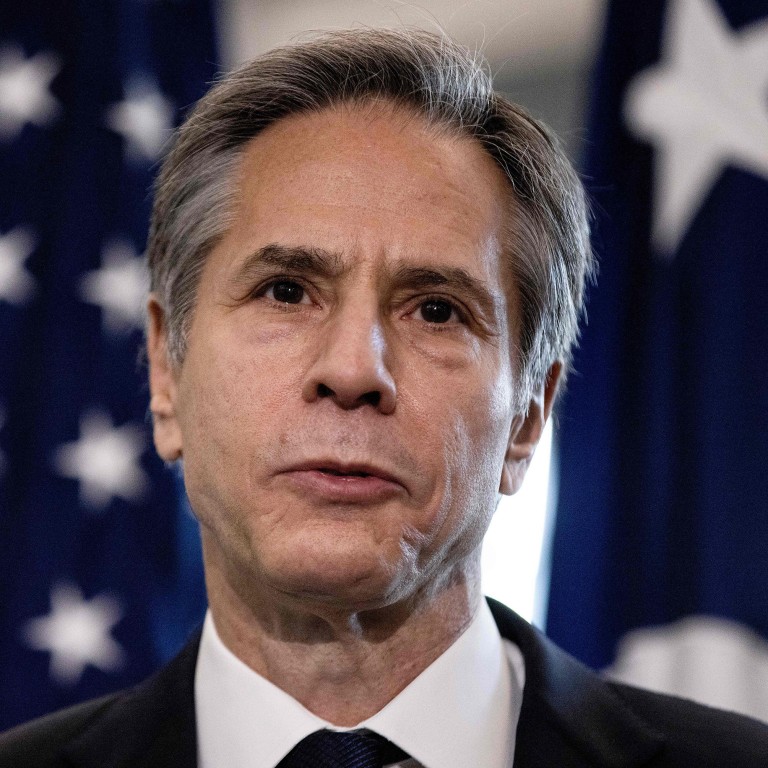
China should avoid seeking global ‘kingship’ amid US tensions, academic says ahead of Antony Blinken visit
- Ju Jiandong, chair professor of finance at Tsinghua University, says China should counter Washington’s decoupling endeavours by building an Asian community
- US Secretary of State Antony Blinken is set to begin a two-day visit to China on Sunday amid escalating tensions between Beijing and Washington
Beijing should not seek a global “kingship”, but instead build an Asian community as the first step to counter Washington’s decoupling endeavours, according to Tsinghua University finance professor who specialises in the US-China trade war.
Ju Jiandong, chair professor of finance at the Beijing-based institute, has long advocated for a bigger role for China in global economic governance.
His comments in the latest issue of the Tsinghua Financial Review this week came ahead of a two-day visit to China by US Secretary of State Antony Blinken, who is set to arrive in Beijing on Sunday amid escalating tensions between the world’s two largest economies.
We need to draw a boundary of markets led by China
“Don’t declare kingship, stabilise markets and promote sharing. [This is my suggested] strategy for the big power competition,” he said in his 5,500-word research paper.
“We need to draw a boundary of markets led by China.”
Ju’s academic article does not necessarily reflect the thoughts of Beijing’s policymakers, but highlights the worries of academics, economists, investors and ordinary Chinese citizens about the fast changing international geopolitics.
Such measures are expected to grow as the size of China’s economy is expected by many economists to surpass the US by around 2030.
Currently, the US accounts for around 25 per cent of the global economic size, higher than China’s 18 per cent.
Ju, citing estimates from international organisations, said China will topple the US as the world’s largest economy between 2030 and 2040, but that its share of the global economy may be unable to surpass 30 per cent.
“Historical data has shown that China, which accounts for less than 30 per cent of the world’s [gross domestic product], does not have enough to seek a global hegemony in terms of economic strength,” he said.
The specific path is to establish an ‘Asian community’ with economies that are closely connected to the Chinese economy
To counter rising US containment, Ju called for more efforts to consolidate China’s overseas markets and also promote the share of knowledge, expertise and technology among its market sphere.
“The specific path is to establish an ‘Asian community’ with economies that are closely connected to the Chinese economy,” he added.
China should consider unilaterally opening up to other economies within the Asian community, which is not confined to just Asian countries, by reducing tariffs to zero if they agree on non-discriminating, transparent and free-trade rules under the World Trade Organization, he said.
The authority of the Geneva-based multinational trade body has been undermined as the US has paralysed the function of its appellate body by blocking the appointment of new judges.
Ju suggested the “Asian community” negotiations can start with developing economies, including Mongolia, Cambodia, Brazil, Chile and Kenya, and then expand to Malaysia, Indonesia, Vietnam and Singapore, leaving the difficult job of persuading Japan, South Korea and India to the end.
China clamours to join CPTPP trade bloc as external pressures mount
“It is realistic to build an Asian community with a combined population of 2 billion to 2.5 billion,” he said.
The Biden administration, meanwhile, has rallied an infrastructure push among the Group of 7 to counter China’s Belt and Road Initiative, stepped up work on its Indo-Pacific Economic Framework for Prosperity, while also proposing the “Chip 4” alliance with South Korea, Japan and Taiwan.

